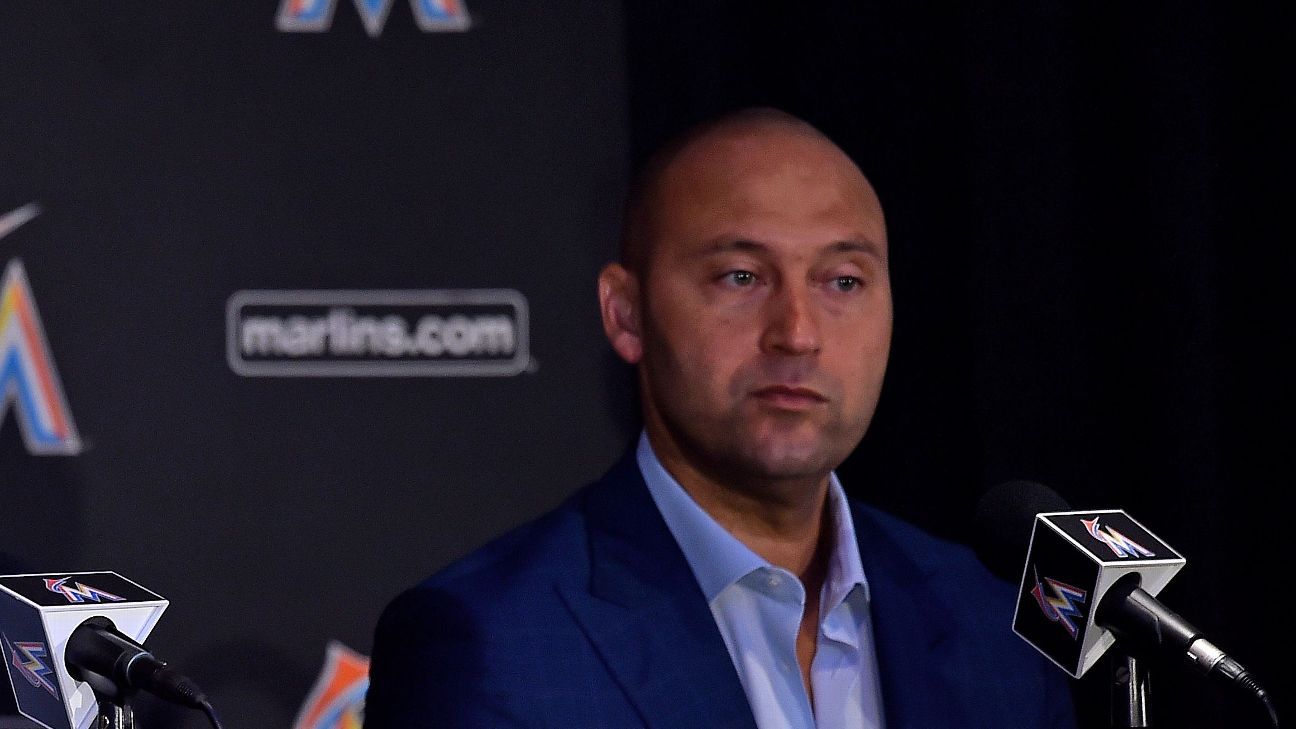MIAMI — Derek Jeter went into the offseason talking about the Miami Marlins spending more money on contracts, figuring out ways to contend and continuing to build for the future.
His focus — or the Marlins’ focus — apparently has changed.
And now, the Hall of Fame player has left the organization, both as its CEO and a shareholder.
Jeter announced a surprise departure from the Marlins on Monday after 4½ mostly unsuccessful years that didn’t come remotely close to matching his success as a player for the New York Yankees. The Marlins had the fourth-worst record in baseball over Jeter’s four seasons, making the playoffs only in 2020 when more than half of the MLB’s 30 teams qualified in the pandemic-affected year.
“Through hard work, trust and accountability, we transformed every aspect of the franchise, reshaping the workforce and developing a long-term strategic plan for success,” Jeter said in a statement released through PR Newswire rather than the Marlins. “That said, the vision for the future of the franchise is different than the one I signed up to lead.”
What that meant wasn’t exactly clear, though Jeter — who wasn’t physically around the team on a day-to-day basis — previously said he had trouble remaining patient in his quest to make the Marlins a winner.
“We have a deep bench of talent that will oversee both business and baseball decisions while we work to identify a new CEO to lead our franchise,” Bruce Sherman, the Marlins’ principal owner, said in another statement released through a public relations firm and not by the team itself.
Jeter became CEO of the Marlins in September 2017 when Sherman bought the team from Jeffrey Loria.
A five-time World Series champion during his playing career spent entirely with the Yankees from 1995 to 2014, Jeter was elected to the Baseball Hall of Fame in 2020.
Miami went 218-327 during his four seasons at the helm, finishing with a winning record only once, at 31-29 in the pandemic-shortened 2020 season. In the full seasons under Jeter the Marlins went 63-98, 57-105 and 67-95.
While the Yankees are among baseball’s highest spenders, Miami was 27th of the 30 teams in payroll last year at $61 million. Jeter said in October that he was hopeful that would change after the Marlins’ revenue streams improved over the last year or so, given a new local television deal and a new naming rights agreement for the team’s ballpark.
Jeter, a shortstop during his playing career, was a 14-time All-Star and the 1996 AL Rookie of the Year. His 3,465 hits still rank sixth-best on baseball’s all-time list, behind Pete Rose, Ty Cobb, Hank Aaron, Stan Musial and Tris Speaker.
And when the playing days ended his desire to run a team was clear. Jeter was part of the group that won the right in August 2017 to buy the Marlins, a $1.2 billion deal that became official about two months later. Jeter had a 4% stake in the purchase, coming on board as the CEO and overseeing baseball operations.
He said he was proud to have put his “name and reputation” on the line in an effort to rebuild the Marlins.
“My family and I would like to thank our incredible staff, Marlins fans, Marlins players, and the greater Miami community for welcoming us with open arms and making us feel at home,” Jeter said. “The organization is stronger today than it was five years ago, and I am thankful and grateful to have been a part of this team.”
Jeter played a key role in the Marlins signing former All-Star outfielder Avisail Garcia to a four-year, $53 million contract in December, just before the MLB lockout began. The Marlins also locked up ace right-hander Sandy Alcantara on a five-year, $56 million deal, and brought back shortstop Miguel Rojas — the clubhouse leader — on a two-year, $10 million contract.
Garcia was the last big splash before the lockout began. Jeter said he went to breakfast with Garcia when the team was deciding whether to go forward because he wanted the outfielder to convince him personally that he desired to be part of the Marlins’ plans.
“I’ve dealt with a lot of people in my life and I think I’m a pretty good judge of character in terms of when someone’s telling me the truth or not, and you could see in his eye he was excited at the possibility of coming here,” Jeter said that day after sharing the stage with Sherman at the signing announcement. “That’s what you want to hear.”
He spoke at length that day about the Marlins’ hopes for the future.
Roughly three months later, that future no longer includes Jeter.
“I thank Derek for his service to the Marlins, the communities of Miami and the game,” MLB commissioner Rob Manfred said. “Derek is a winner on and off the field … a pillar of our game and we look forward to his future contributions to baseball.”
